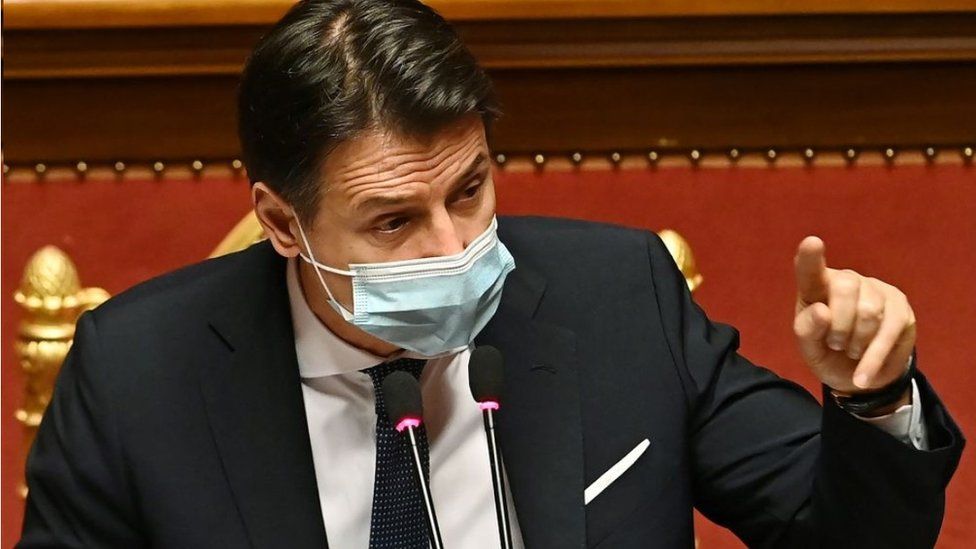Italy PM Conte wins crucial Senate vote to stay in power
- Published

Italian Prime Minister Giuseppe Conte has won a crucial vote to stay in power - days after former PM Matteo Renzi pulled his party out of the coalition.
The vote in the Senate - 156-140, with 16 abstentions - means, however, that Mr Conte does not have an absolute majority in the upper chamber.
Opposition parties say they plan to ask President Sergio Mattarella to intervene to force him to resign.
Mr Conte, a law professor, has been prime minister since 2018.
He first led a populist coalition, but the main parties in the current centrist government are the anti-establishment Five Star (M5S) and the centre-left Democratic Party (PD).
The prime minister told the Senate it was vital to maintain political cohesion faced with the "historic challenge" of the pandemic.
Speaking in the Senate debate, Mr Renzi told Mr Conte to make bolder reforms, saying "Italy is wasting its biggest opportunity since the Marshall Plan" - a reference to the US aid for war-shattered Europe in 1948. He accused Mr Conte of being preoccupied with distributing government posts.
Even if Mr Conte had lost the vote, a snap election was not a certainty as President Mattarella still has the option of inviting him to assemble a new coalition.
On Monday he won a confidence vote in the Chamber of Deputies - the lower house - by 321 to 259, securing an absolute majority there.
Mr Renzi objects to Mr Conte's plans for spending €209bn (£186bn; $254bn) of EU recovery funds - part of a €750bn EU rescue for the Covid crisis.
The former prime minister wants investment in the digital economy and green energy, and rejects Mr Conte's plan to let technocrats, rather than MPs, decide spending priorities.
Italy has had plenty of minority governments before, but that outcome would leave Mr Conte weaker at a time of national emergency, with Italians struggling under partial lockdown.
"We risked everything to survive" - Naples resident Filomena
Addressing senators, Mr Conte said: "It's very hard to govern in these conditions, with people who continuously place mines in our path and try to undermine the political balance patiently reached by the coalition".
Italy has recorded 82,554 deaths linked to coronavirus - the second-highest official toll in Europe after the UK. It has more than 25,000 patients in hospital with Covid-19.
Italy was the epicentre of the pandemic in Europe last March, and its tranche of the new EU recovery package is the largest.
Mr Renzi's Italia Viva, formed in 2019, polls less than 3% currently, and surveys suggest that right-wing parties would come top in a snap election, were one to be called two years ahead of schedule.
Victory, but no resolution
Giuseppe Conte has survived - for now. But this is not the strong sign of parliamentary backing that he wanted.
If he continues as prime minister, it would mean each legislative move would need horse-trading and negotiations in the Senate. And that at the very worst time, in the grip of a pandemic that has killed more than 83,000 Italians and unleashed the deepest economic crisis since World War Two.
Other Italian prime ministers have commanded minority governments. And Giuseppe Conte could now decide to stay in office and seek a few extra backers in the coming weeks - possibly tempting them with a ministry or a change of policy.
But he may decide it's time to pass the buck up to the president, who would hold discussions with party leaders to determine who could become prime minister or whether fresh elections would beckon.
So it's another political crisis in a country that's seen 66 governments since 1945. Exactly what it didn't need as it battles through coronavirus.
More on Italy's Covid crisis:
Related Topics
- Published24 April 2020
- Published25 June 2021
- Published30 November 2020
- Published5 July 2022
- Published4 May 2020
- Published14 January 2021